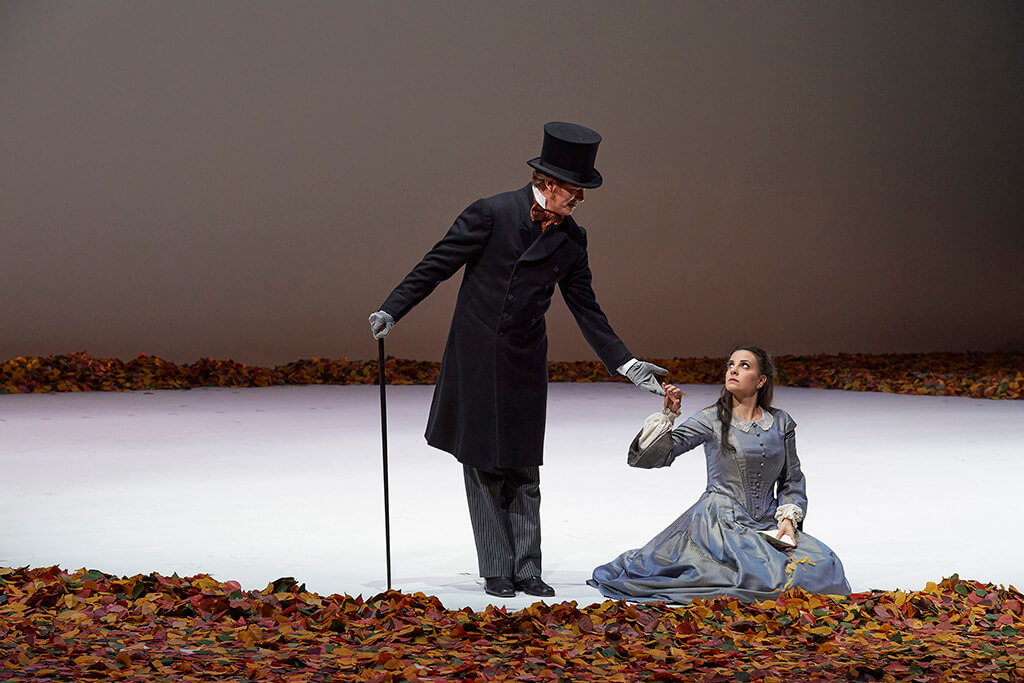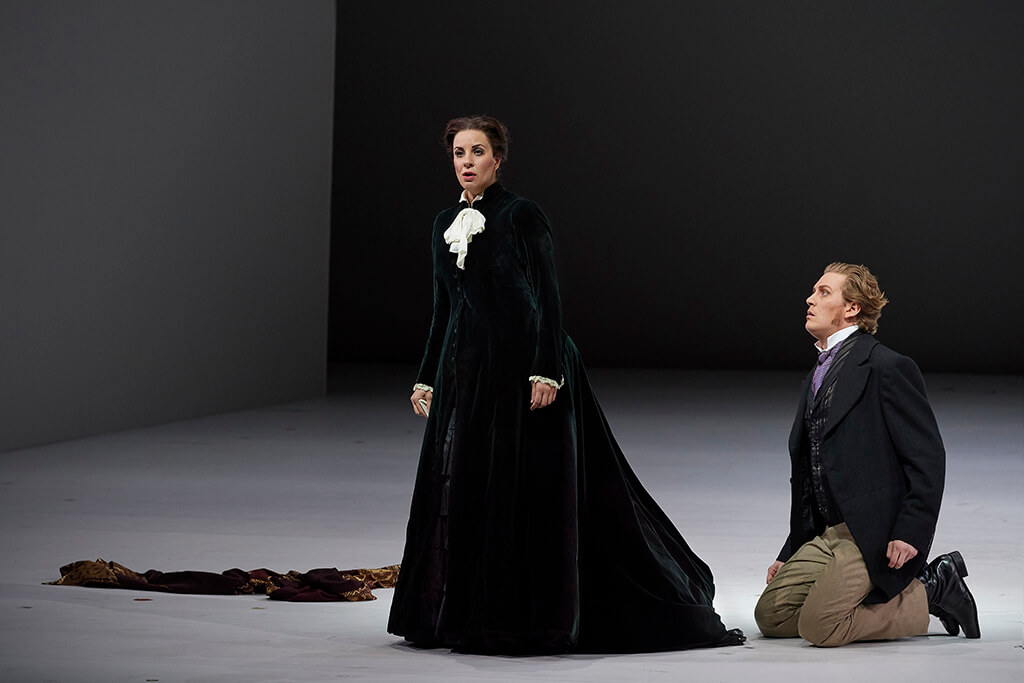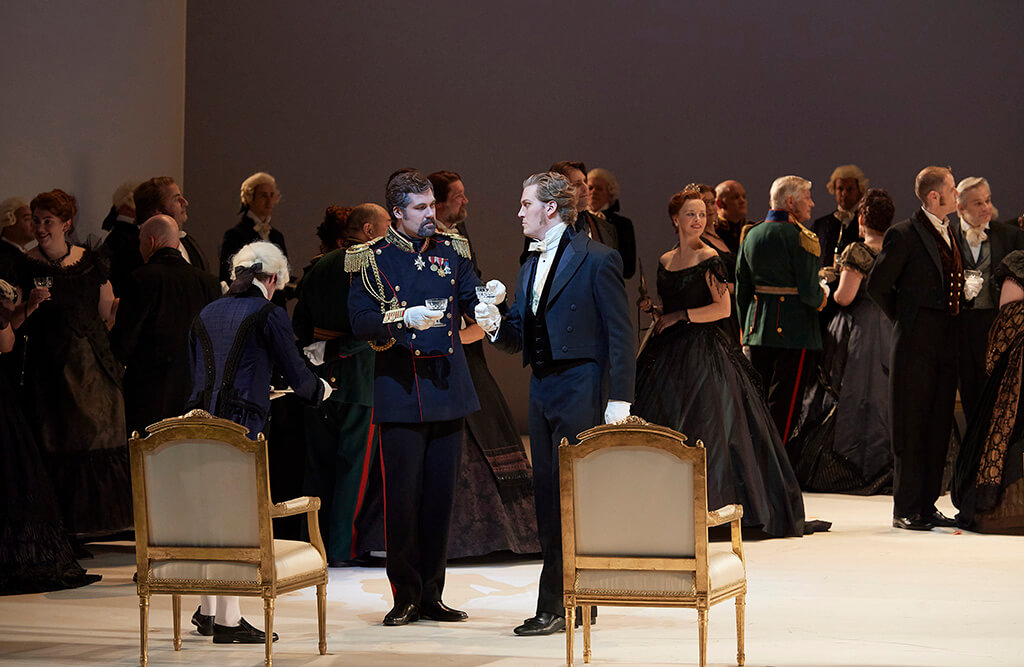
Eugene Onegin / Pyotr Ilyich Tchaikovsky
Canadian Opera Company: Gordon Bintner (Onegin), Joyce El-Khoury (Tatiana), Joseph Kaiser (Lensky), Varduhi Abrahamyan (Olga), Oleg Tsibulko (Prince Gremin), Christophe Mortagne (Monsieur Triquet), Helene Schneiderman (Madame Larina), Margaret Lattimore (Filipevna). Peter McClintock, Revival Director, Robert Carsen, Original Director, Johannes Debus, Conductor. COC Orchestra and Chorus. September 30 at the Four Seasons Centre.
Eugene Onegin is Tchaikovsky’s most popular opera. According to worldwide performance statistics from the 2017-18 season, it ranks 15th in popularity out of a total of 2,713 operas. It received a total of 1,568 performances in 364 productions, beating out such perennial warhorses as Turandot (1,347), Lucia di Lammermoor (1,000), I Pagliacci (983) and Otello (970).
Based on one of Aleksander Pushkin’s best-known works, Eugene Onegin the opera amply demonstrates Tchaikovsky’s creative genius, with a felicitous combination of sure-fire theatricality and uncommon melodic inspiration. And when a performance can boast a great cast, striking directorial vision with deft staging, and a maestro leading a superb orchestra with a knowing hand, it’s an unalloyed pleasure.
The stars were aligned this afternoon in the Canadian Opera Company’s season opener. This Robert Carsen/Michael Levine production originated from the Met, where it premiered in 1997. The New York audience, with their penchant for lavish sets and general opulence, found the minimalist approach too austere. At the premiere, singers were cheered but the creative team was met with a mixture of cheers and boos, par for the course in German houses, but rare on this side of the pond.

The Met premiered a new Onegin in 2013, directed by Deborah Warner. I don’t think I am alone in feeling that it’s less compelling than the Carsen production it replaced. None other than the New York Times’s senior critic Anthony Tommasini called the Warner production “muddled” and “tentative.” But the Met’s loss is COC’s gain, as the Carsen production was bought by the Company. It’s now seen at the FSC for the first time. Having revisited it this afternoon for the first time in over a dozen years, I find it as striking as ever.
The production has almost no sets to speak of, just three huge walls. Props such as tables and chairs are brought on and off by supernumeraries. The most distinctive feature is a stage floor in Act One covered with fallen leaves which, together with evocative lighting, gives it a poignant, autumnal air. A scrim, used at the beginning of several scenes, suggests flashbacks. The stripped down, deconstructionist approach has the benefit of getting rid of all the visual excesses while compelling the audience to focus on the “essentials,” that is the inner emotional worlds of the characters. What we ended up with is a powerful psychological treatment that packs an emotional wallop.
The directorial duties fall into the hands of Peter McClintock, who has done a superb job. One is struck by the detailed and highly nuanced staging. Every character’s motivations and actions are clearly delineated and logically presented. Olga’s elation at the gift from Lensky turns to disappointment when it turns out to be more reams of poetry. It makes her motivation to flirt with Onegin more believable. Filippyevna is a bit of a rebel in this production. She rather resents Madame Larina, and when the mistress leaves, Filippyevna proceeds to eat the apples she was working to peel. It’s little touches like these that make the characters come alive.

Having seen more productions of Onegin than I care to count, I must say Carsen’s vision for the title character ranks among the coldest. To go from having shot Lensky dead at the end of Act 2 immediately to dressing for the ball scene in Act 3 without a break makes his character particularly chilling. Bintner plays “cold” so well that it’s downright scary. I have seen productions where Onegin breaks down sobbing and embracing the dead Lensky, but not this one! More of an issue is the time lapse of four years that’s supposed to have happened between Acts 2 and 3, not made clear in this production without an intermission.
Musically, it was a triumphant afternoon. Everyone sang well, with not a weak link. Kudos to Joyce El-Khoury for bringing Tatiana to life dramatically. Vocally the role’s tessitura is quite low, but the soprano has the solid middle register to do it justice, not to mention her trademark exquisite high pianissimos, very much in evidence in the final scene. Gordon Bintner (Onegin) is the epitome of the Romantic anti-hero, singing with gorgeous, warm tone. It’s a role that will serve him well into the future.
Baritone-turned-tenor and former COC Ensemble artist Joseph Kaiser sang a most poetic “Kuda, kuda,” one of the best I’ve heard. Armenian mezzo Varduhi Abrahamyan, who was amazing as Polinesso two years ago, returns as a terrific Olga. Two more veteran mezzos took on supporting roles with impressive results — Helene Schneiderman as an ingratiating Madama Larina, while Margaret Lattimore was a vocally and dramatically vivid Filippyevna.
Moldovan bass Oleg Tsibulko, last seen as the Emperor in Stravinsky’s Nightingale and other Short Fables, was an exceptionally youthful Prince Gremin. French character tenor Christophe Mortagne was a perfect Monsieur Triquet. I would be remiss not to mention the sonorous Zaretsky of first-year COC Ensemble bass-baritone Joel Allison, or the engaging Captain of fellow baritone Samuel Chan. All in all, an exceptionally strong cast.
That said, the lack of a physical set proved challenging for the singers. The huge space created by the three walls and the lack of a ceiling mean the voices tend to dissipate rather than being propelled into the auditorium. Conductor Johannes Debus tried to hold down the orchestra, but it’s not easy to do, especially when the sound coming from the pit was so thrilling. Kudos to Debus for being the busiest man at the COC these days, doing double duty conducting both Onegin and Hadrian. Last but not least is the excellent work of the COC Chorus, with a special nod to the women’s chorus. All in all, a most auspicious season opener, and not to be missed.
Eugene Onegin runs Oct. 4 – Nov. 3. Full details, here.
- SCRUTINY | Opera Atelier’s All Is Love Makes Triumphal Return - April 15, 2024
- SCRUTINY | From The Heart: Ema Nikolovska And Charles Richard-Hamelin Offer Unique Program At Koerner Hall - March 26, 2024
- SCRUTINY | The Glenn Gould School Spring Opera Presents A Superb Dialogues Des Carmélites - March 22, 2024



